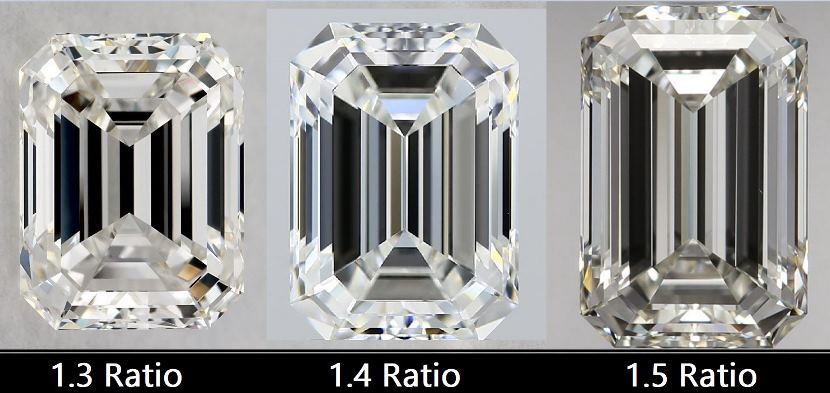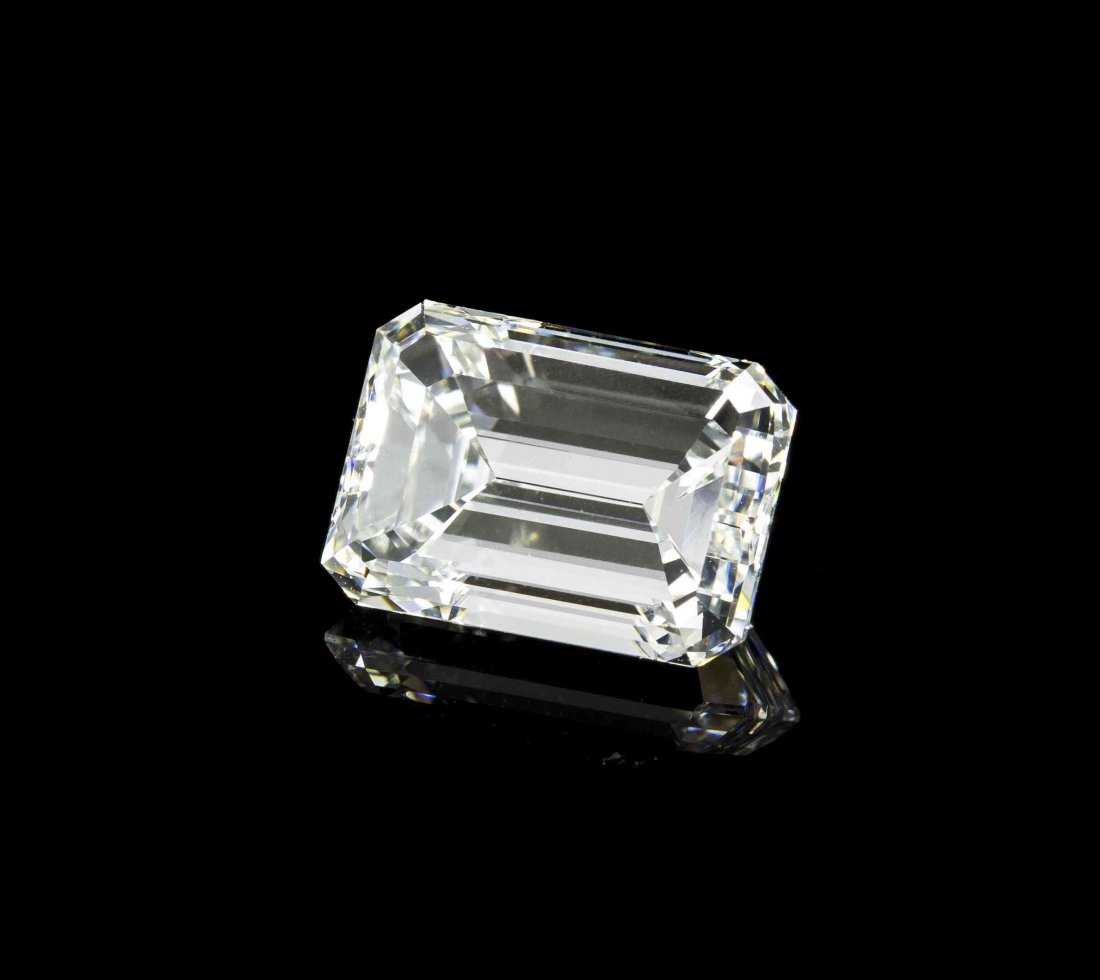Emerald Cut Diamond
Emerald Cut Diamond
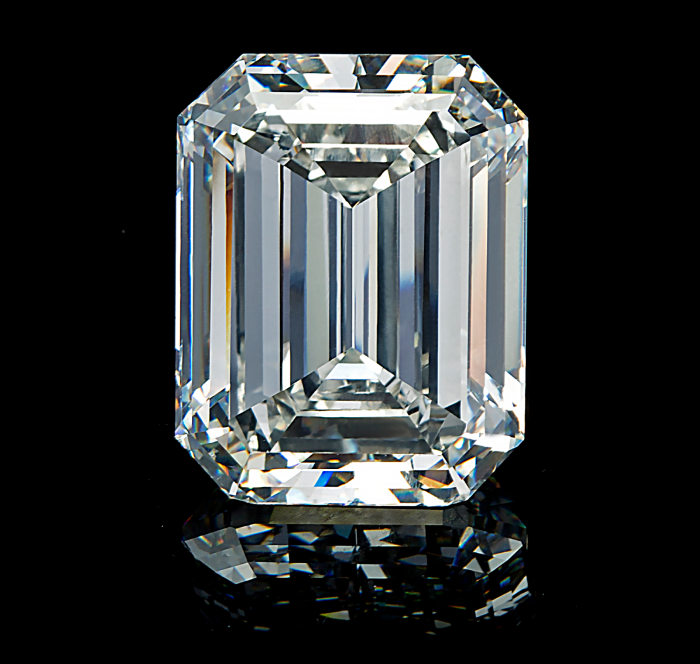
Key Takeaways:
- Emerald cut diamonds are among the most popular diamond shapes. They are different because of their classic and antique nature. They have a step-cut with only 58 facets. If you are looking for something elegant, go for an emerald cut diamond.
- Since emerald cut diamonds have open facets on the table, we recommend that you prioritize the clarity grade in emerald cut diamonds. Go for VS2/SI1 at a minimum.
- A good square alternative of the emerald cut diamonds is Asscher Cut Diamonds.
- While a length-to-width ratio of 1.3-1.55 is standard, we generally prefer the 1.4-1.5 range. Make sure that you know what you prefer.
- In terms of cut, a depth of 59-69% and a table of 58-72% is recommended. See the chart below for accurate numbers.
- We recommend GIA and AGS as the top labs. Make sure that you buy a GIA-graded diamond.
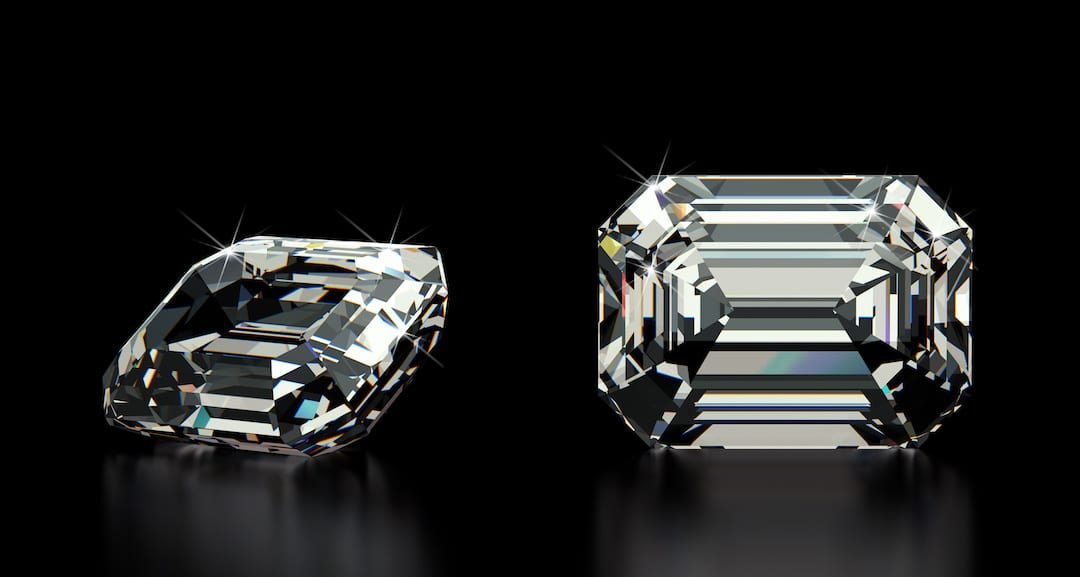
Overview:
Cutting diamonds into an emerald shape dates to the 13-14th century when diamonds were beginning to make their way to popular culture. The modern emerald cut diamond has 58 facets, roughly 25 on the crown, 25 on the pavilion, and 8 on the girdle with 3 rows each of bottom and top steps. These luminous gems feature step-cut (or trap-cut) because it has rows of facets different from other fancy cut shapes. These facets are arranged in rectilinear style parallel to the girdle, typically in a staircase form, hence the name step-cut.
Usually, the corners of diamonds are the weakest points for a typical stone, but emerald cut diamonds beautifully address this concern. The emerald cut diamond features a keel running through the pavilion terminus that is not available in other diamond cuts.
During the Art Deco period, many of the antique jewelry pieces featured step-cut styles, which is why diamond lovers today are keen to recapture the aesthetics of that time. If you love the classic style typically found in antique jewelry, choosing an emerald cut diamond will not be a bad idea.
Analyzing the Cut:
| Depth %
Poor/Fair: <52.5 or > 80 / 74.6 – 80 Good: 57 – 59 / 71- 74.5 Very Good: 58-61/67.4-70.1 Excellent: 61.3 – 67 |
Table %
Poor/Fair:<50 or >80/50-52.5 or 75.5-80 Good: 53-57/74 Very Good: 58-61/71 Excellent: 62-70 |
| Culet
Poor/Fair: Very Large/Large Good: Slightly large Very Good: Medium/Very Small Excellent: None |
Girdle
Poor/Fair: Ex. Thin – Ex. Thick Good: Very thin – thick Very Good: Very thin – slightly thick Excellent: Very thin – slightly thick |
| Length to Width Ratio for Square Shape
Poor/Fair: >1.09 /1.07-1.09 Good: 1.05-1.06 Very Good: 1.00-1.04 Excellent: 1.00-1.04 |
Length to Width Ratio for Rectangular Shape
Poor/Fair: >1.90 /1.81-1.90 Good: 1.20-1.29/1.63-1.80 Very Good: 1.30-1.38/1.51-1.70 Excellent: 1.39-1.50 |
The chart above serves as a general guideline when evaluating the cut of an emerald cut diamond. The length to width ratio of 1.50 is considered the classic cut for a rectangular-shaped emerald cut diamond. However, the recent trend is towards a square shape with a ratio of 1.30. Consult SGDX for precise measurements and the length to width ratio of these elegant diamonds.
Evaluating Color:
Like evaluating the color in other diamond shapes, color in an emerald cut diamond is critical. The higher the color grade, the better. In our experience, many buyers prefer the warmer colors over the colorless colors given the price difference. The warmer colors refer to the near colorless range of G – I color diamonds in the color spectrum, while the colorless ones to D-F color diamonds. The price premium for a lower color grade emerald cut diamond would be significantly lower. Since the body of emerald cut diamonds is large and contains open facets, choosing a higher color grade is recommended when buying an emerald cut diamond.
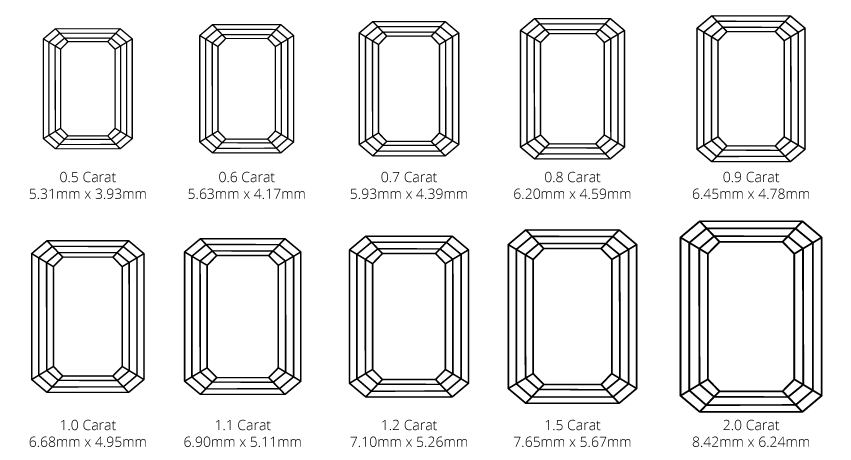
For more detailed information on the color of the emerald cut diamond, use the table below:
| < 0.50 Carat
Poor/Far: >M/ L-M Good: I Very Good: G-H Excellent: D-G |
0.51 – 1.0 Carat
Poor/Fair: J-K / >L Good: I Very Good: H Excellent: D-G |
| 1.0 – 2.0 Carat
Poor/Fair: H-I / >I Good: J/I Very Good: G-H Excellent: D-F |
2.0 Carat
Poor/Fair: H-I / >I Good: H-I Very Good: F-G Excellent: D-E |
| Florescence
Poor/Fair: Very Strong/Strong Good: Medium Very Good: Faint Excellent: None |
Choosing Clarity:
Given that emerald cut diamonds have open facets, we recommend buying a slightly higher clarity emerald cut diamond. Each one of our customers has a unique standard for clarity and color. Some want a flawless diamond, while others are perfectly comfortable with inclusions if they are not noticeable to the naked eye. The GIA provides excellent help with their clarity grades. You can use it to choose an emerald cut diamond that will meet your standards.
SI1 would be an outstanding balance of price and appearance in an emerald cut. You can also consider buying VS2 for a comparable choice.
| < 0.50 Carat
Poor/Far: >I1/ I1 Good: SI1-SI2 Very Good: SI1-SI2 Excellent: FL-VS1 |
0.51 – 1.0 Carat
Poor/Fair: I1-I3 Good: SI1-SI2 Very Good: VS2-SI1 Excellent: FL-VS1 |
| 1.0 – 2.0 Carat
Poor/Fair: I1 / >I1 Good: SI2 Very Good: SI1/ VS2 Excellent: FL-VS1 |
2.0 Carat
Poor/Fair: I3/II1 Good: SI2 Very Good: SI1/VS2 Excellent: FL-VS1 |
Budget Constraints:
The following options are suggested regarding carat weight, cut, color, and clarity for people with budget constraints.
Excellent Choice:
- At least 1.0 carats in Weight
- Very Good to Excellent Polish and Symmetry
- G or above in Color
- SI1 or above in Clarity
- No Fluorescence
- Length/width ratios: 0.95 – 1.05 for square or 1.5 to 1.60 for a rectangular shape
Very Good Choice:
- At least 0.90 carats in Weight
- Good to Excellent Polish and Symmetry
- H or above in Color
- SI1 or above in Clarity
- None, faint or medium blue Fluorescence
- Length/width ratios: 0.95-1.05 for square or 1.45 to 1.65 for rectangular shape
Good Choice:
- At least 0.80 Carats in Weight
- Good to Very Good Polish and Symmetry
- I or above in Color
- SI1 or above in Clarity
- None, faint or medium blue Fluorescence
- Length/width ratios: 0.95-1.05 for square or 1.4-to 1.68 for rectangular shape
Credit: Sharif Khan on 22nd Jul 2021

